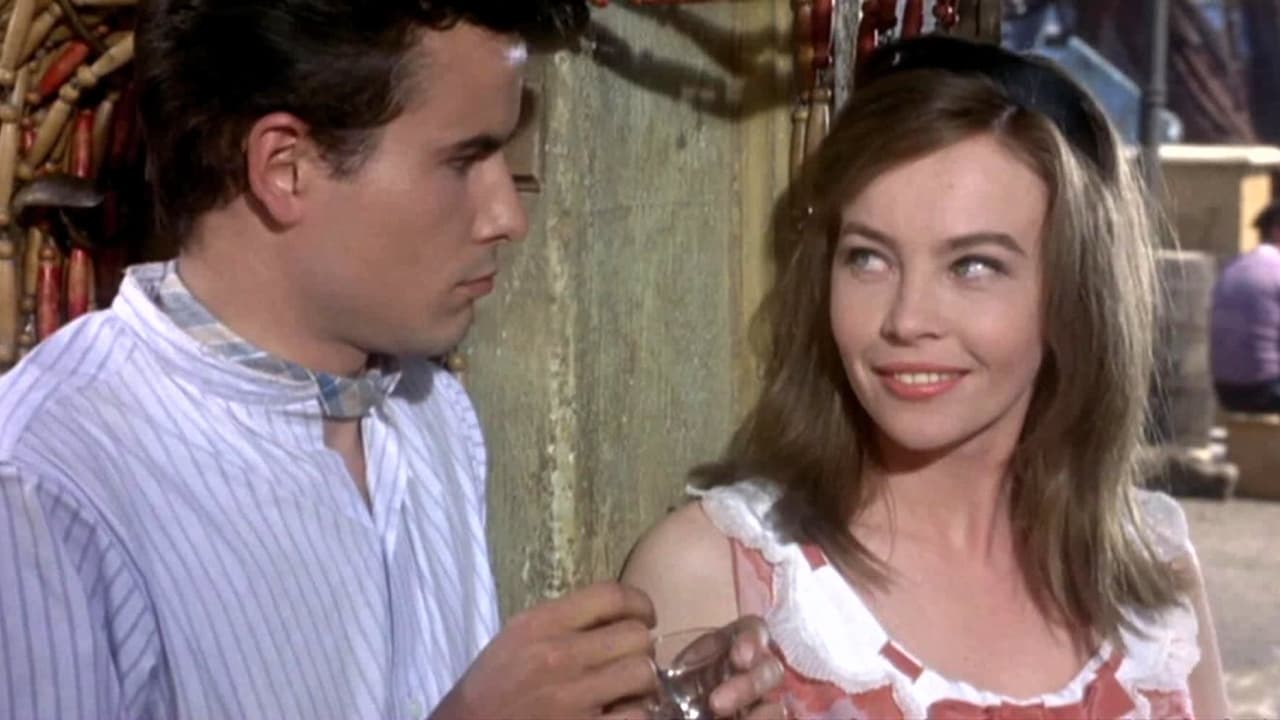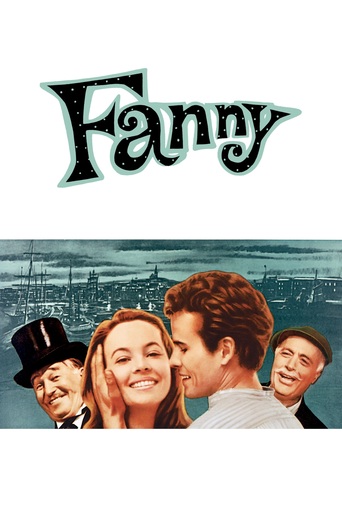



The greatest movie ever!
Self-important, over-dramatic, uninspired.
It is a performances centric movie
There's a more than satisfactory amount of boom-boom in the movie's trim running time.
View MoreI hang my head in shame and declare that I'd never heard of this story before in any of its incarnations. I came across the dvd in a bargain bin and am delighted that I did - a real jewel. Take a handsome brooding young man, and dangle before him a pretty girl whom he's known all his life. Add a rough and ready father and a charming old love rival and you have a good mixture. I thought this was the best thing I'd seen Maurice Chevalier in, and possibly Leslie Caron too. I don't think I've seen Horst Buscholz before - possibly would have remembered! - but he's good even if he overdoes the sulky brooding bit. I thoroughly enjoyed the 'hat trick' and the rascals who performed it. Charles Boyer can do no wrong and even a young Lionel Jeffries. Amazing cast. A thoroughly enjoyable, well-rounded piece of entertainment and for what it is worth, I think taking songs out of it gave it greater credibility and depth.
View MoreI won't play the "movie purist" card and pretend that it's not possible to remake Marcel Pagnol's "Marseilles" trilogy, it IS possible. But it's not possible to replace an actor like Raimu, he wasn't just César the gruff and wise barkeeper on Marseilles' waterfront, he was the soul of Marseilles' trilogy, he was the voice, the spirit and the star. So, it's as hard imagining the trilogy without him than "Casablanca" without Bogart. Yet Raimu died before the final opus "César" was made into a play, and Pagnol's three-part story had such an immediate international resonance that it was begging for remakes and adaptations and that it inspired a successful Broadway musical is a credit to the universality of the story. So the show had to go on.But no one can replace Raimu, and in fact, even the other players, Orane Demazis who played the fragile but progressively confident Fanny, Fernand Charpin who played the brave bourgeois Panisse, not to mention Pierre Fresnay as the bitter and tormented Marius were all hard to replace, so one must make the distinction between remaking and retelling. This is what Joshua Logan's "Fanny" does, it reprises the Broadway musical but adapts it into the movie format, compacting the three original movies into one of two hours and ten minutes. The film is colored and colorful, magnificently rendering the sunny soul of Marseilles, and the blueness look even more attractive and hypnotic for Marius whose childhood dream is to escape from the banality of life. He's the freest character of the trilogy, but not the wisest.Wisdom belongs to César, the barkeeper, and the film tactfully starts with a replay of the famous scene where he shows his son Marius that it takes one third of four different ingredients to make some cocktail. There can't be four thirds, Marius says. It depends on the size of the thirds, retorts César. This scene demonstrates the power of this character, even when he speaks nonsense, he's actually right because he always makes his point. He's the touchstone of a saga of French intonations but that deals with universal life themes such as duty, gender roles and social customs, making almost a hero out of an old man marrying a young woman because he's saving her from disgrace and gives a poor out-of-wedlock child a name. Marseilles' trilogy belongs to the past but that doesn't prevent from rooting for Marius' dreams, Fanny's unfaithful thoughts and Panisse's financial arguments when he woos Fanny, César is actually the most transparent of all, no wonder he's the pillar of the story.Now, it all comes down to one question: does Joshua Logan's "Fanny" do justice to the original trilogy? It is a matter of opinion and depends on the way you look at the original trilogy. If it's a verbal masterpiece with great insightful quotes about life and death, such as "honor being like a match, you only use it once" or "an empty chair can be sadder than a grave" then yes, "Fanny" of 1961 is a great tribute to Pagnol's eloquence and capability to translate with the right words the emotional complexities of human psyche. Now, if you forever associate the film to the spectacular performance of Raimu, these intimate moments caught in black-and-white, with a few tear-pulling revelations, volcanic tirades and histrionic confrontations, you might find in "Fanny" a pale imitation. But for the film's defense, I don't think anyone ever tried to imitate an actor, one of the film's masterstrokes was to cast French actors, it's twice an excellent idea, they're all aware of the trilogy's reputation and their accent give the film's French touch.Charles Boyer was believable as a man who'd embody César's psychological traits without being Raimu's César, Leslie Caron added her own dimension of tragic melancholy and even Maurice Chevalier was surprisingly poignant as the unsung hero Panisse. I could even have seen him nominated instead of Boyer. Horst Bucholz was good as Marius, with a sort of Montgomery Clift's fire burning in his dark eyes, and like a good cocktail, Joshua Logan doesn't take the initial trilogy for granted, he changed the balance and gave Fanny and Panisse get the most important roles, maybe only Raimu could have made a passive observer like César such a driving force. But "Fanny" is structured in such a way that the actions sometimes count more than the little introspective moments, even though they spiced up the original trilogy.So maybe that's the one flaw I'd concede to "Fanny", it puts a lot of good things together but it lacks that little zest that made the first trilogy such a tasty cocktail. And while it provides some powerful emotional moments, the conclusion is treated in a rather rushed away, with a ten-year old boy and a new house in the countryside. I don't know what inspired these artistic licenses, but it sadly took away the film from the atmosphere and the spirit it had set up, there's a sort of change in the air that feels awkward and make hardly believable that so many secrets, revelations, pains and troubles would be relieved in one day, ten minutes in cinematic language, and while I was critical of Césariot's character in the original film, the child doesn't exactly exude realistic vibes and his immediate complicity with Marius was sadly corny."Fanny" doesn't shine right away but there are like two hours of the film that work and despite a clumsy beginning and awkward ending, it doesn't ruin the enjoyment for all that, I'd still recommend watching the original first. In fact, I'd recommend the original, period.
View MoreThere is something about Leslie Caron. I was an instant fan when I saw her older movies, and I remained a fan with her newer movies. She is best known for her sweetness and her dancing, but mostly overlooked is that she is a fine dramatic and comedic actress also.Here Leslie Caron is Fanny, still a teenager as the movie begins, even though she was almost 30 during filming. She lives in a close-knit fishing area on the Marseilles harbor. Also there is Horst Buchholz, in his late 20s during filming, as teenager Marius. They grew up together and there is some affection between them, but we don't really know how much. Maurice Chevalier, already in his 70s, is local raconteur Panisse who operates his small business. A widower, he has no children, but has saved the letters "& SON" for the front of the building, still hoping one day he will have a son. He is sweet on Fanny, in spite of their great age difference, but no one takes that too seriously.Marius has wanderlust for the sea, he wants to sail and see the world while he is young. |Fanny doesn't want him to go, but she cares for him and wants him to be happy, so encourages him. Much later we find out she didn't really want him to go. They have a one-night fling of passion and, after Marius is gone, Fanny finds out she is with child. To save face for everyone, Fanny decides to marry Panisse, and even though all the close friends realize the biological father is Marius, Panisse is proud to call the boy his son. Fanny is a faithful wife, although we eventually find out their marriage is only one of convenience. A fine 1960s romantic drama with several big stars of that period. Highly recommended. Watched on Netflix streaming movies.SPOILERS: Around the time the boy turned 1 Marius returned to the area. He had a brief encounter with Fanny, they both professed love for each other but did the right thing and afterwards stayed away from each other. Fanny, Panisse, and their son became a very nice family life together. When the boy was about 10 or so Marius re-entered the picture, Panisse realized how much he and Fanny loved each other, and how well the boy got along with Marius, he had a letter of "proposal" written, for Marius to marry Fanny when Panisse died, which appeared to be very soon.
View MoreI have been reading all these raves about this movie which I just saw on TMC this morning, 11/4/10, and thought I would write my thoughts. Certainly felt there was an overuse-age of the same song over and over again. I kept asking myself could not the composer think of another? What was with all the close ups? We can see a person's expression without a head shot filling the screen. Leslie Caron wasn't dancing with Gene Kelley and Horst Buchholz wasn't following the other '6" in the Magnificent 7. I liked him better in that movie than this one. There was the 2 older actors, Charles Boyer and Chevalier who I suppose were passing the reins onto the younger generation they were pleasant enough but the reins never passed as both of the actors never did much after this movie, unless you liked Father Goose or How the West was Won.Bottom line is its about a small village, a teenage one night stand that turns into a nightmare when she finds out she is pregnant. Basically after she let's him follow his dream, her mother, his father and the local rich man keep the 'secret' by a quick marriage and a 'pre-mature' birthing which made the rich man's family very happy. Of course you could not get away with that nowadays, someone would be screaming for a DNA testing. It's really just a soap opera in Technicolor, why an R rating? I have no clue, it should have been a PG-13. There was no bad language, no violence, no nudity and sex was mildly implied compared to today's standards. The only thing I could think of is it gives the impression that if a girl gets pregnant and her boyfriend heads out she can still get support for her child without government getting involved. Actually, I like that idea but it only happens in the movies so don't try this at home.
View More